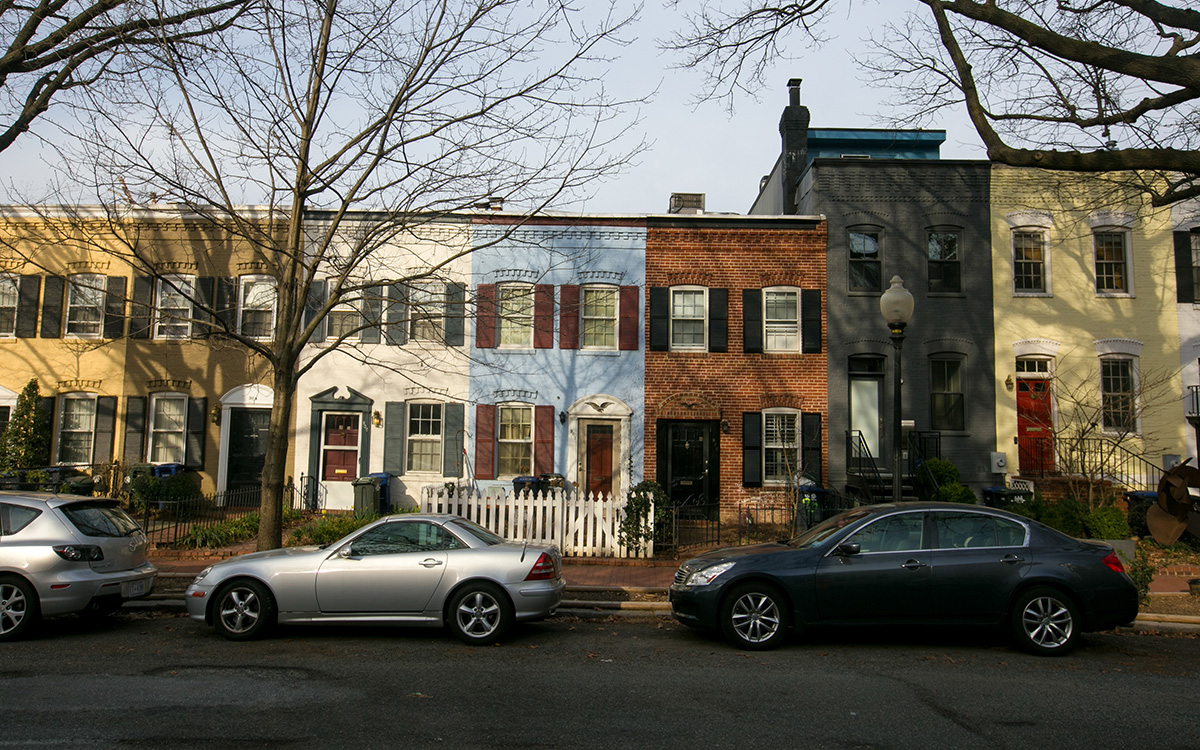Real Estate
The homeowner’s guide to exercise
Surprising health benefits of taking care of your house


Cleaning your house burns a surprising amount of calories. (Photo by iStock)
If you’re like many of us, you made a New Year’s resolution to lose weight and get in shape. You threw away the bags of chips in the pantry, gave the rest of the Christmas cookies to the neighbor kids and vowed never again to walk down the ice cream aisle at Harris Teeter. You even brought the treadmill up from the basement so you could exercise while watching “Flowers in the Attic.”
Yes, your intentions were admirable (as were mine), but then that comfy sofa started calling your name, Jillian Michaels became even more annoying and you couldn’t resist ordering extra pizza and nachos for Sunday’s Super Bowl game.
To those of you who love working out at the gym, playing Ultimate Frisbee with your pals on a cold Saturday morning or jogging around the National Mall, I salute you. But if you’re like me, always the last person picked for a team from elementary through high school, the humiliation of public exercise and lack of sports ability still takes its toll many years later.
Most experts agree that you need to burn 3,500 calories to lose a pound of fat, so it’s hard enough for people on the chocolate chip pancake diet just to stay even, but we forget about the everyday things we do that can contribute to weight loss. Here’s what I suggest.
Get up in the morning. In the 10 minutes it takes to make your bed, you burn 27 calories. Brush your teeth to burn 34 more and style your hair for 20 minutes to burn another 72.
Clean the house. Spend 20 minutes washing dishes – by hand, no cheating – to burn 63 calories, then get to the real work. Thirty minutes each of dusting, vacuuming, mopping floors, washing windows, doing the laundry and ironing will yield a 773-calorie deficit. But also consider the additional benefit – the 30 extra minutes spent running up and down the stairs doing all this for the 245-calorie burn.
Mind the kids. How much time do you spend carrying a baby on your hip? One hour equals 302 calories burned. An additional hour of playing with your child at the park consumes another 327.
Walk the dog. A 30-minute walk will help you and your dog burn 143 calories. Have more than one dog? Walk them individually.
Go to work. Driving for an hour consumes 172 calories, so some might say that commuting is actually good for you.
Decorate and renovate. My favorite home stager is in great shape and it’s no wonder, since 60 minutes spent rearranging the furniture will burn 540 calories. Take an hour to paint that spare bedroom, something that’s been on your To Do list for six months, and you’ll burn 409 calories. A 30-minute home repair garners 184 more.
Do weekend chores out of doors. There’s an outdoor chore for every type of weather. Take 30 minutes each for the following tasks and feel the burn: raking leaves (164), shoveling snow (245), mowing the lawn (178), tending the garden (222) and washing the car (184).
Have a party. Go grocery shopping for an hour for a 286-calorie burn (no nibbling along the way, please) then cook dinner for half an hour when you get home for another 108. When your friends arrive, play an hour of bridge to lose 130 calories, tickle the ivories during a 30-minute sing-along for 113 more and finish off the evening with an hour of dancing to your living room Wii console for 486.
Go to bed. Finally, sleep for seven hours and burn 530 calories.
Now, for those of you who have been waiting for me to mention it, sex does indeed enter into the picture; however, 10 minutes of foreplay only burns 20 calories and 20 minutes of, er, follow-up, surprisingly only burns 115, so when your best friend tells you he burned 1,000 calories having sex last Saturday night, be impressed. I know I am.
Valerie M. Blake can be reached at 202-246-8602 or [email protected]. Each Keller Williams Realty office is independently owned and operated. Equal Housing Opportunity.
Real Estate
What property should I purchase if I’m not sure how long I’ll be in D.C.?
Row homes, English basements and more options abound

Great question! If you are looking at real estate as an investment – two great property types to look at would be a smaller row home and also a row home that has an English basement. Some property types that you might want to stay away from would be a condo or a co-op unit. Let’s take a look at why these properties would be good and bad:
Smaller Row Home
Row homes are a great investment for many reasons. You can often find smaller two-bedroom row homes in the same price point as those of a two-bedroom condo, which might be seen as a “condo alternative” and afford you much more freedom. There are no condo associations or home owner associations that you must belong to so this keeps your monthly carrying costs on the lower end and you are allowed to make more independent decisions. For example, if you wanted to paint the house purple – in most cases you would be allowed to. If you wanted to change the color of the front door or put shutters on the windows – you would be allowed to. This is usually not the case with condo or co-ops.
When it comes to the rental market – similarly renters like the independence of privacy in a home and not being among many other people. The luxury of perhaps direct off-street parking, outdoor space or even just more space at the same rental amount that a two bedroom condo rent would be – this is more appealing for a renter and would likely rent faster than that of a condo or co-op. For this model – you would obviously need to move out before you could take advantage of the investment of this type of real estate.
A row home with an English basement
With this type of real estate you can immediately begin receiving income after your purchase. You can occupy the upstairs of the row home, which is usually the larger portion of the home, or you could even occupy the basement, which is usually the 1-2 bedroom smaller portion of the home and receive rental income for the other half of the home. This can be in the way of a yearly traditional tenant or in the manner of short-term rentals (check with the most recent STR policies within the District). With this model, you stand to make even more of a return on your investment upon your move out of the home as you can rent the entire home or you can rent the top unit and basement unit independently to gross a larger amount of income. It is important to note that it is never advised to purchase a row home unless you can fully afford it WITHOUT the idea of accepting additional rental income to offset the mortgage cost.
These two options listed above are the most typical found within the District because they are fee simple, standalone pieces of real estate and are not within a condo association, HOA, or a co-op with governing documents that tell you what you can and cannot do which makes row homes an attractive type of real estate for a long-term hold.
When looking at types of properties that you might want to stay away from – condos and co-ops come to mind and I say this with a caveat. You can surely purchase these types of real estate but must first understand the in’s and out’s of their governing documents. Condos are bound by the governing condominium documents which will tell you for how long your lease must be, a minimum of lease days, you can only rent after you have lived in the residence for a number of years, likely will stipulate no transient housing – which means no short term rentals. It could also quite possibly say that you can only rent for a specific amount of time and lastly it will also stipulate that only a specific amount of people can rent at one time in order to stay below the regulated lending requirements set forth by Fannie and Freddie Mac. Similarly, Co-ops are even more strict – they can tell you that you are just not able to rent at all or if you can you can only do so for a specific number of years and then you are required to sell or return back to the unit as your primary residence.
As you can see, when it comes to condos and co-ops there are more specific and stringent bylaws that owners must agree to and follow that limit or even outlaw your ability to rent your piece of real estate. When you purchase a row home – there are no regulations on what you can and cannot do regarding rentals (outside of the short-term regulations within the District).
When looking for a piece of real estate in the District it is important to think through how long you could possibly wish to hold onto this property and what the future holds. If you think this is a long-term hold then you might consider a row home option – again, you can find a smaller two-bedroom row home that amounts to that price similar to a two-bedroom condo and would afford you a more flexible lifestyle. It’s important to work with a real estate agent to ensure that they guide you in this process and help answer any questions you might have. It’s also always advised to speak directly to a short-term rental specialist should you wish to go down that route as they will truly understand the in’s and out’s of that marketplace.
All in all, there are specific property types that work for everyone and within the District we have a plethora of options for everyone.
Justin Noble is a Realtor with Sotheby’s International Realty licensed in D.C., Maryland, and Delaware for your DMV and Delaware beach needs. Specializing in first-time homebuyers, development and new construction as well as estate sales, Justin provides white glove service at every price point. Reach him at 202-503-4243, [email protected] or BurnsandNoble.com.
Real Estate
The rise of virtual home tours
Adapting to changing consumer preferences in spring real estate

In today’s dynamic real estate market, the spring season brings not only blooming flowers but also a surge of activity as buyers and sellers alike prepare to make their moves. However, in recent years, there’s been a notable shift in how consumers prefer to explore potential homes: the rise of virtual tours.
For the LGBTQ community, these virtual experiences offer more than just convenience; they provide accessibility, safety, and inclusivity in the home buying process.
Gone are the days of spending weekends driving from one open house to another – unless that’s your thing of course, only to find that the property doesn’t quite match expectations. With virtual tours, you can explore every corner of a home from the comfort of your own space – find something interesting? Schedule a showing with any LGBTQ Realtor at GayRealEstate.com.
This is particularly significant for LGBTQ individuals, who may face unique challenges or concerns when attending in-person showings. Whether it’s the ability to discreetly view properties without fear of discrimination or the convenience of touring homes located in LGBTQ-friendly neighborhoods across the country, virtual tours offer a sense of empowerment and control in the home buying process.
Moreover, virtual tours cater to the diverse needs of the LGBTQ community. For couples or families with busy schedules or those living in different cities or states, these digital walkthroughs provide a convenient way to view properties together without the need for extensive travel. Additionally, for individuals who may be exploring their gender identity or transitioning, virtual tours offer a low-pressure environment to explore potential living spaces without the added stress of in-person interactions.
At GayRealEstate.com, we understand the importance of adapting to changing consumer preferences and leveraging technology to better serve our community. That’s why our agents offer an extensive selection of virtual tours for LGBTQ individuals and allies alike – visit our website, choose an agent and within minutes you’ll have access to the Multiple Listing Service (MLS) via their website.
From cozy condominiums in bustling urban centers to sprawling estates in picturesque suburbs, virtual tours showcase a wide range of properties tailored to diverse tastes and lifestyles.
In addition to virtual tours, GayRealEstate.com provides comprehensive resources and support to guide LGBTQ buyers and sellers through every step of the real estate journey. Our network of LGBTQ-friendly agents is committed to providing personalized service, advocacy, and representation to ensure that all individuals feel respected, valued, and empowered throughout the process. Plus, we are happy to provide a free relocation kit to any city in the USA or Canada if you are a home buyer.
As we embrace the spring season and all the opportunities it brings in the real estate market, let’s also celebrate the power of virtual tours to revolutionize the way we find and experience our future homes. Whether you’re searching for your first apartment, forever home, or investment property, GayRealEstate.com is here to help you navigate the exciting world of real estate with confidence, pride, and inclusivity.
Jeff Hammerberg is founding CEO of Hammerberg & Associates, Inc. Reach him at [email protected].
Real Estate
Boosting your rental property’s curb appeal
Affordable upgrades to attract and keep tenants happy

In the District of Columbia, the rental market tends to open up significantly during the springtime for several reasons. First, spring brings about a sense of renewal and change, prompting many individuals and families to seek new living arrangements or embark on relocations. Additionally, the warmer weather and longer daylight hours make it more conducive for people to explore housing options, attend viewings, and make decisions about moving. Furthermore, spring often coincides with the end of academic terms, leading to an influx of students and young professionals entering the rental market.
Landlords and property managers also tend to schedule lease renewals or list new vacancies during this time, capitalizing on the increased demand and ensuring a steady turnover of tenants. In the competitive world of rental properties, attracting and retaining quality tenants can be challenging. However, with some strategic upgrades, property owners can significantly enhance their units’ appeal without breaking the bank. From enhancing curb appeal to interior upgrades, here are some practical and cost-effective ideas to make your rental property stand out in the market.
Curb appeal
First impressions matter, and curb appeal plays a crucial role in attracting potential tenants. Simple enhancements like freshening up the exterior paint, adding potted plants or flowers, and ensuring a well-maintained lawn can instantly elevate the property’s appearance. Installing outdoor lighting not only adds charm but also enhances safety and security.
Interior upgrades
Upgrade the kitchen and bathroom fixtures to modern, energy-efficient options. Consider replacing outdated appliances with newer models, which not only appeal to tenants but also contribute to energy savings. Fresh paint and updated flooring can transform the look of a space without a hefty investment. Additionally, replacing worn-out carpets with hardwood or laminate flooring can make the unit more attractive and easier to maintain.
Enhance storage
Maximize storage options by installing built-in shelves, cabinets, or closet organizers. Tenants appreciate ample storage space to keep their belongings organized, contributing to a clutter-free living environment.
Improve lighting
Brighten up the interiors by adding more lighting fixtures or replacing old bulbs with energy-efficient LED lights. Well-lit spaces appear more inviting and spacious, enhancing the overall ambiance of the rental unit.
Upgrade window treatments
Replace outdated curtains or blinds with modern window treatments that allow natural light to filter in while offering privacy. Opt for neutral colors and versatile styles that appeal to a wide range of tastes.
Focus on security
Invest in security features such as deadbolts, window locks, and a reliable alarm system to ensure the safety of your tenants. Feeling secure in their home is a top priority for renters, and these upgrades can provide meaningful, genuine peace of mind.
Enhance outdoor spaces
If your rental property includes outdoor areas like a patio or balcony, consider sprucing them up with comfortable seating, outdoor rugs, and potted plants. Creating inviting outdoor spaces expands the living area and adds value to the rental property.
As landlords, investing in the enhancement of your rental properties is not merely about improving aesthetics; it’s about investing in the satisfaction and well-being of your tenants, and ultimately, in the success of your investment. By implementing these practical and affordable upgrades, you’re not only increasing the desirability of your units but also demonstrating your commitment to providing a high-quality living experience.
These efforts translate into higher tenant retention rates, reduced vacancy periods, and ultimately, a healthier bottom line. Moreover, by prioritizing the comfort, safety, and happiness of your tenants, you’re fostering a sense of community and trust that can lead to long-term relationships and positive referrals. So, let’s embark on this journey of transformation together, turning rental properties into cherished homes and landlords into valued partners in creating exceptional living spaces.
Scott Bloom is owner and Senior Property Manager of Columbia Property Management. For more information and resources, visit ColumbiaPM.com.


















